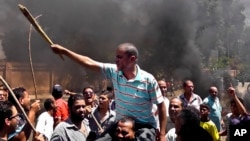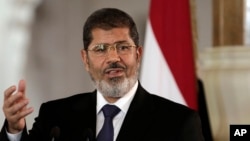WASHINGTON D.C. —
A year after being elected president and almost three years since Egypt was rocked by the Arab Spring uprisings, Mohamed Morsi is increasingly in trouble with the nation’s electorate and, possibly, its military.
When Morsi took office last year, his public approval rating stood at 57 percent, with most saying he and his Muslim Brotherhood party were “a positive development.”
But with the economy in shambles and the electorate increasingly wary of the Muslim Brotherhood’s intentions, a new public opinion poll conducted by Zogby Research Services (ZRS) now rates Morsi’s approval at 28 percent.
Even the general Morsi appointed as defense minister and army chief is warning that the military may have to intervene if the government and its opponents can’t reconcile their differences before massive anti-government demonstrations scheduled next Sunday
.
The Zogby poll gauged the opinions of 5,029 Egyptian adults between April 4th and May 12th, 2013. It concluded that almost all of the 28 percent voicing approval for Morsi were identified with his Muslim Brotherhood party or other Islamists like the Al Nour Salafi party.
Significantly, the poll indicated more than 70 percent of the electorate are now concerned that "the Muslim Brotherhood is keen to Islamize the state and control its executive powers."
Muslim Brotherhood seen as overreaching
But the polling also showed that the public considers Egypt’s political opposition groups such as the National Salvation Front and the April 6th Movement splintered and poorly organized. Even when considered together, the opposition could claim the confidence of only 35 percent of the adult population, while 40 percent of the electorate appeared to have no confidence in either the government or any of the opposition parties.
The poll also looked at who might step in as president if Morsi falters and gauged the popularity of nine potential leaders, including all those who head major parties or who ran for president against Morsi. None were viewed as credible by more than a third of the electorate.
The only person showing significant support was Bassem Yousef, a popular TV satirist who has been charged by the government with insulting the presidency and Islam.
But the most remarkable number in the polling by far was the 94 percent approval rating given the army, which won strong support from all sectors and parties. Those who supported opposition parties and Egypt's so-called “silent majority” also indicated they would like to see the army play a larger role in society.
Few were surprised then when General Abdel-Fattah el-Sissi, the army chief who also serves as defense minister, warned over the weekend that the military was prepared to step in if liberal and Islamist supporters clash violently in next Sunday’s scheduled demonstrations.
El-Sissi said the military would then be obligated to intervene to prevent Egypt from plunging into “a dark tunnel.”
“Egypt is in crisis,” concluded pollster James Zogby. “The economy is in shambles with no clear direction, rights are being eroded, and a minority-supported party controls the power over a deeply fractured polity.”
What is next in Egypt?
But Zogby and other experts on Egypt say Morsi’s Muslim Brotherhood, with its superior organizational abilities, will remain hard to challenge politically.
“The movement (the Brotherhood) doesn't need to be popular if it continues its ability to rally its followers around a cause and to the ballot box,” said Zogby. “Until the opposition builds an organization that can compete, the Islamists could remain on top.”
One unknown factor in this equation is the so-called Tamarrod (rebel) movement, which says it has collected 15 million signatures on a petition voicing "no confidence" in Morsi, who won the presidency with 13 million votes. The petition campaign has accused the Morsi administration of "failing to implement promised policies that improve the life of ordinary people."
The Zogby poll also looked asked about potential support for new parliamentary elections, an idea put forward by the Islamic parties. But Zogby’s polling indicated the idea is rejected by most other Egyptians, with a substantial majority saying that they do not believe new elections would be fair or transparent. The opposition, and a majority of the electorate, strongly favors drawing up a new constitution, an idea is rejected by supporters of the main Islamic parties.
The only proposal that receives near unanimous support from all groups is the convening of "a real national dialogue,” though how this could be carried out and what it could achieve remain vague.
Is there a role for the U.S.?
Though many believe the Tamarrod movement could spark the kind of government-changing events of the Arab Spring in 2011, few are convinced events would develop in the same way again.
“The Obama administration is not expected to repeat its support for another popular uprising,” said Zogby, “but rather might call for continued efforts to build the democratic institutions and conduct parliamentary elections.”
Marina Ottaway, a senior scholar at the Woodrow Wilson International Center in Washington, argues that the only thing the U.S. can do is to encourage Egypt’s secular opposition to organize and be ready to achieve better showing in any new parliamentary elections.
When Morsi took office last year, his public approval rating stood at 57 percent, with most saying he and his Muslim Brotherhood party were “a positive development.”
But with the economy in shambles and the electorate increasingly wary of the Muslim Brotherhood’s intentions, a new public opinion poll conducted by Zogby Research Services (ZRS) now rates Morsi’s approval at 28 percent.
Even the general Morsi appointed as defense minister and army chief is warning that the military may have to intervene if the government and its opponents can’t reconcile their differences before massive anti-government demonstrations scheduled next Sunday
.
The Zogby poll gauged the opinions of 5,029 Egyptian adults between April 4th and May 12th, 2013. It concluded that almost all of the 28 percent voicing approval for Morsi were identified with his Muslim Brotherhood party or other Islamists like the Al Nour Salafi party.
Significantly, the poll indicated more than 70 percent of the electorate are now concerned that "the Muslim Brotherhood is keen to Islamize the state and control its executive powers."
Muslim Brotherhood seen as overreaching
But the polling also showed that the public considers Egypt’s political opposition groups such as the National Salvation Front and the April 6th Movement splintered and poorly organized. Even when considered together, the opposition could claim the confidence of only 35 percent of the adult population, while 40 percent of the electorate appeared to have no confidence in either the government or any of the opposition parties.
The poll also looked at who might step in as president if Morsi falters and gauged the popularity of nine potential leaders, including all those who head major parties or who ran for president against Morsi. None were viewed as credible by more than a third of the electorate.
The only person showing significant support was Bassem Yousef, a popular TV satirist who has been charged by the government with insulting the presidency and Islam.
But the most remarkable number in the polling by far was the 94 percent approval rating given the army, which won strong support from all sectors and parties. Those who supported opposition parties and Egypt's so-called “silent majority” also indicated they would like to see the army play a larger role in society.
Few were surprised then when General Abdel-Fattah el-Sissi, the army chief who also serves as defense minister, warned over the weekend that the military was prepared to step in if liberal and Islamist supporters clash violently in next Sunday’s scheduled demonstrations.
El-Sissi said the military would then be obligated to intervene to prevent Egypt from plunging into “a dark tunnel.”
“Egypt is in crisis,” concluded pollster James Zogby. “The economy is in shambles with no clear direction, rights are being eroded, and a minority-supported party controls the power over a deeply fractured polity.”
What is next in Egypt?
But Zogby and other experts on Egypt say Morsi’s Muslim Brotherhood, with its superior organizational abilities, will remain hard to challenge politically.
“The movement (the Brotherhood) doesn't need to be popular if it continues its ability to rally its followers around a cause and to the ballot box,” said Zogby. “Until the opposition builds an organization that can compete, the Islamists could remain on top.”
One unknown factor in this equation is the so-called Tamarrod (rebel) movement, which says it has collected 15 million signatures on a petition voicing "no confidence" in Morsi, who won the presidency with 13 million votes. The petition campaign has accused the Morsi administration of "failing to implement promised policies that improve the life of ordinary people."
The Zogby poll also looked asked about potential support for new parliamentary elections, an idea put forward by the Islamic parties. But Zogby’s polling indicated the idea is rejected by most other Egyptians, with a substantial majority saying that they do not believe new elections would be fair or transparent. The opposition, and a majority of the electorate, strongly favors drawing up a new constitution, an idea is rejected by supporters of the main Islamic parties.
The only proposal that receives near unanimous support from all groups is the convening of "a real national dialogue,” though how this could be carried out and what it could achieve remain vague.
Is there a role for the U.S.?
Though many believe the Tamarrod movement could spark the kind of government-changing events of the Arab Spring in 2011, few are convinced events would develop in the same way again.
“The Obama administration is not expected to repeat its support for another popular uprising,” said Zogby, “but rather might call for continued efforts to build the democratic institutions and conduct parliamentary elections.”
Marina Ottaway, a senior scholar at the Woodrow Wilson International Center in Washington, argues that the only thing the U.S. can do is to encourage Egypt’s secular opposition to organize and be ready to achieve better showing in any new parliamentary elections.












